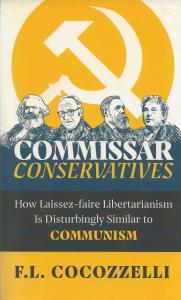
F.L. Cocozzelli. Commissar Conservatives. How Laissez-faire Libertarianism Is Disturbingly Similar To Communism (New York: Progressive Works Publishing, 2022), xliii + 259 pgs.[1]
After the fall of the Soviet Union, many in the West believed that the collapse of the Soviet regime was proof that capitalism was superior in all ways to communism. They explained that this meant not only that capitalism was good, but because it was good, the more it can be left unfettered, the more good capitalism can and would lead to in the world. For this reason, they suggested any attempts to regulate capitalism would undermine the greater good, meaning, all such attempted must be stopped. Indeed, as such attempts worked to hinder capitalism, that meant there had to be some socialistic reason underlying attempts to fetter capitalism with regulations, and so it was important to point out that those fighting against even the worst instincts of capitalism had to be rejected as socialistic. This, of course, meant that the worst instincts of capitalism were promoted. Moral questions were ignored. Profit alone was all that mattered. And as socialism was condemned by many Christians, including Catholics, many Christians came to promote the notion that laissez-faire forms of capitalism are what Christians must follow when dealing with economic issues. This, however is far from the truth, which is what Pope Benedict XVI wanted to make clear in 2007:
Both capitalism and Marxism promised to point out the path for the creation of just structures, and they declared that these, once established, would function by themselves; they declared that not only would they have no need of any prior individual morality, but that they would promote a communal morality. And this ideological promise has been proved false. The facts have clearly demonstrated it. The Marxist system, where it found its way into government, not only left a sad heritage of economic and ecological destruction, but also a painful oppression of souls. And we can also see the same thing happening in the West, where the distance between rich and poor is growing constantly, and giving rise to a worrying degradation of personal dignity through drugs, alcohol and deceptive illusions of happiness.[2]
The problem, it can be said, is that socialism and unbridled capitalism are two sides of the wrong coin. We have been led to accept this coin, to believe that if we do not agree with and promote what is established by one group, such as socialists, we should then accept what the others say without hesitation. Since the coin is wrong, since the duality established here is in error, then, as there are elements which both Marxists and capitalists get right, accepting one without question or regulation will only lead to the elimination of some good. That is, there are good ideas found within both Marxism and in capitalism which can help promote justice and the common good, even as there are elements within either of them, when followed without conditions, which end up promoting injustices. To overcome this, many note that there is the need to regulate whatever system one follows, and to engage and take the best from the other. One must not be dogmatic. Thus, many in the West will say the best system is a capitalistic system, but they will also point out that such capitalism must not be unregulated, nor should following capitalism lead us to accept the notion that only profit matters. The common good must be affirmed, and if and when someone uses profit in such a way as to harm the common good, that harm must be countered so that the common good can be restored. This kind of vision is what is found in F.L. Cocozzelli’s book, Commissar Conservatives.
Commissar Conservatives should be seen connected with what Pope Benedict XVI was interested in promoting when he criticized both Marxism and unfettered capitalism. Cocozzelli promotes a kind of middle ground, one which is not ideological or dogmatic, though bent towards the promotion of capitalism over socialism. He makes it clear that dogmatism is often what gets in the way of the promotion of the common good. His work complements Pope Benedict’s points by showing how unfettered capitalism, especially as it is promoted by libertarians, has been and continues to be destructive, and ends up promoting a similar kind of tyranny as found in authoritarian systems of communism:
It is today’s libertarian-laced conservatism that shares much of communism’s dark and Machiavellian tendencies. This is particular true when it comes to character, temperament, and ultimate outcomes (4).
Just as there are debates within Marxism for different versions of Marxism, some which are more authoritarian and dogmatic than others, so we find with those who embrace capitalism those who are fighting against each other as to how capitalism should be used to create policies for the state. Libertarians are promoting the worst form of capitalism, the kind which cause many people to needless suffer for the good of a few, and when too many suffer, this will encourage them to embrace socialism or communism to fight against the injustices they experience. But, Cocozzelli explains, libertarians are not really interested in preventing socialism, they are more interested in their own well-being. They want to make their own, unfettered version of capitalism appear as the only orthodox kind, so that then, once socialism is denied, they come out on top. This is why they appear more interested in the internal debate within capitalism itself than dealing with real-world socialism:
Indeed, if any economic outlook creates fertile ground for authoritarian socialism, it is to be found within the current trend of conservative economics. But it is neither socialism, nor communism that libertarian conservatives fear. Indeed, their nightmare is the emergence of a better capitalism, one that is made fair and just through reform; one that is less prone to the tyranny of those only interested in pursuing reckless, unreasonable self-interest (5).
Similarly, Cocozzelli notes, libertarians, with their view of capitalism, are similar to Marxists, because both of them embrace economic materialism, looking to subsume everything under the domain of economics:
For both the laissez-faire libertarianism and the communist, freedom and liberty are primarily confined to economic materialism. It is a cold and mechanical interpretation with little regard for more abstract notions of those rights (42).
Thus, for those following such an economic materialism, people, and their work, are as good as they are worth monetarily:
Labor is thought to be as nothing but a commodity, stripped of human dignity, something to be purchased, used, and disposed of once the worker’s utility is exhausted. The individual laborer’s human value is no longer a factor to be considered in his or her employment. The only laws to be applied to him or her are the laws of a fictional self-regulating market (15).
This can explain the reason why libertarians are indifferent to the plight of the worker, or indeed, to human dignity; they have no problem promoting various principles, such as human dignity or the right to live, as long as they can make a profit it, but if a principle gets in the way of profit, they put profit above anything else. This is what we have seen in the era of COVID-19, where libertarian politicians rejected pandemic precautions (masks, lockdowns, vaccination mandates) because they view those precautions as hurting their profit. When the pursuit for profit leads policy makers to ignore human dignity, with the only real indication of what someone is worth being dependent upon the money they have or make, thank those who are not making profits, those without money, will lose their basic rights and freedoms. In in a libertarian-inspired system, as the average person hardly has sufficient economic means to withstand the ravages of the system, the average person finds their rights whittled away. This is why Cocozzelli suggests libertarian policies and principles end up being as autocratic and brutal as policies found in the worst communist regimes. And yet, once again, we find resistance to libertarianism and its desire to promote profit over the common good, being denounced by many as socialistic, which is why so many who reacted against COVID19 policies meant to save lives as socialism. Nonetheless, as Cocozzelli explains, those who claim this are disingenuous, because neither socialism nor communism are involved. The terms are being used improperly. For socialism is about centralizing the means of production with the people, which often means politically, especially in communism, the state:
Any policy not based on Karl Marx’s central premise – the state’s ownership of the means of production – isn’t Marxist socialism or communism. To call something socialism and suggest a link to Marxist ideology without those conditions is hyperbolic gaslighting (22).
When dealing with the way the common good is being destroyed, it is important we do not embrace one of its root causes, that is, pure economic materialism. Nor should we be dogmatic in our efforts. We should be flexible, willing to learn from everyone, adapting the system to best suit the needs of the people, which is what Cocozzelli suggests is found in the best forms of capitalism, those promoted by liberals. Indeed, if one is flexible, one can learn from Marxist critiques without accepting all their conclusions or suggested solutions, and use them, not for the promotion of socialism, but to improve capitalism:
It is this flexibility that allows liberals (as well as social democrats and those open-minded conservatives) to employ Keynesian economics, with its understanding that demand creates supply, and not the other way around. It allows progressive capitalists to borrow from socialism, not to destroy capitalism, but to improve it when such ideas increase the ability of individuals to acquire and keep property (44).
This is why, if and when someone studies and engages Marx, this does not mean they are necessarily Marxists. As long as they understand where Marx went wrong, they can use his ideas to discern problems at hand without becoming Marxists themselves. Thus, contrary to Marx, he says:
But an individual selling his labor to an entrepreneur does not automatically constitute exploitation. A business owner or an investor does have a right to a portion of the surplus value of a finished product. Reward for risk, sacrifice, and development concept is not unjust (130).
What is important is that capitalism is regulated in such a way that those who make a profit do not get to use it to exploit others. That unbridled capitalism can and does lead to such exploitation does not mean all forms of capitalism need do so. But to make sure this does not happen, regulations are important. Without them, exploitation will commence, which is why those who promote libertarianism, with its denial of such regulations, end up causing the condition which make for people to try socialistic responses to the problems at hand:
Strident conservatism will create far more Marxist s than progressive liberalism ever will. Civic exclusion, voter suppression, and race-based barriers to wealth creation are some of the authoritarian socialist’s best friends (139).
In this, and in many other observations, Commissar Conservatives works to find a middle way between absolute socialism or communism and absolute libertarian capitalism, recognizing the error of both, similar to the way Pope Benedict XVI did. Indeed, it goes father into the issues, looking at how they remain with us in the present day. Cocozzelli is primarily concerned in the way the common good is being destroyed by those who adhere to libertarianism, and as such, he explores their thought, and how it relates to their political actions. This allows him to explain why their policies must be rejected, even as he rejects the authoritarian abuses of various communist states. Truly, the common good, not just the good of one group, needs to be protected – as St John Paul II wisely stated:
The State cannot limit itself to “favouring one portion of the citizens”, namely the rich and prosperous, nor can it “neglect the other”, which clearly represents the majority of society. Otherwise, there would be a violation of that law of justice which ordains that every person should receive his due. “When there is question of defending the rights of individuals, the defenceless and the poor have a claim to special consideration. The richer class has many ways of shielding itself, and stands less in need of help from the State; whereas the mass of the poor have no resources of their own to fall back on, and must chiefly depend on the assistance of the State. It is for this reason that wage-earners, since they mostly belong to the latter class, should be specially cared for and protected by the Government”.[3]
F.L. Cocozzelli gives us a good indication of a way forward, a way to help make sure that we remain looking for and promoting the common good. He does so following inspiration from his Catholic, social justice background, one who is interested in the reforms promoted by Msgr. John A. Ryan. Of course, as with all books, there is a limit to what it can discuss. It would be nice to look at and examine various forms of capitalism, and see how they relate to each other, but also what distinguishes them. Perhaps a discussion of free markets, and their history, and the way capitalism became connected to them, could serve as a starting point for such a discussion. Nonetheless, as it stands, the book gives a good introduction and analysis of the problems which emerge when a libertarian ideology is embraced, an analysis which can serve to complement Pope Benedict XVI’s principles, but also which can be read on its own (for those who have no religious bent). It presents some of the history associated with libertarianism, and its “founding fathers,” showing us why it is not just modern libertarians, but the ideology as a whole, which must be rejected. As we see the rise of libertarian influences in politics, this kind of criticism and warning is a necessary, and hopefully many people will read it and employ its analysis as a way to confront the libertarians of our age.
[1] Full disclosure: this was a book I was sent to review by Frank Cocozzelli, who is an online friend of mine. We are both interested in the pursuit of justice and the promotion of the common good, which is why he thought it would be good for me to read his book and offer a review of it. Page numbers for quotes from the book are put in parenthesis.
[2] Pope Benedict XVI, “Address To The Inaugural Session Of The Fifth General Conference Of The Bishops of Latin America And The Caribbean” (5-13-2007). ¶4.
[3] Pope St. John Paul II, Centesimus Annus. Vatican translation. ¶10.
Stay in touch! Like A Little Bit of Nothing on Facebook.
If you liked what you read, please consider sharing it with your friends and family!
N.B.: While I read comments to moderate them, I rarely respond to them. If I don’t respond to your comment directly, don’t assume I am unthankful for it. I appreciate it. But I want readers to feel free to ask questions, and hopefully, dialogue with each other. I have shared what I wanted to say, though some responses will get a brief reply by me, or, if I find it interesting and something I can engage fully, as the foundation for another post. I have had many posts inspired or improved upon thanks to my readers.













